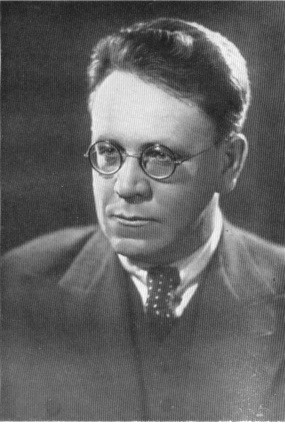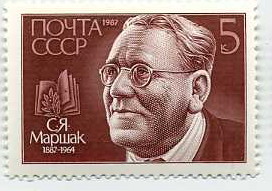Samuil Marshak facts for kids
Quick facts for kids
Samuil Ya. Marshak
|
|
|---|---|

Samuil Marshak (1934)
|
|
| Born | 3 November 1887 Voronezh, Russian Empire |
| Died | 4 July 1964 (aged 76) Moscow, Russian SFSR, Soviet Union |
| Resting place | Novodevichy Cemetery, Moscow |
| Language | Russian |
| Nationality | Russian |
| Alma mater | University of London |
| Genre | Poetry |
Samuil Yakovlevich Marshak (also spelled Samuil Yakovlevich Marchak) (Russian: Самуи́л Я́ковлевич Марша́к; November 3, 1887 – July 4, 1964) was a famous Russian and Soviet writer. He was a poet and translator who wrote amazing stories and poems for both children and adults.
Marshak translated many works, including the sonnets of William Shakespeare and other English poems. He also translated poetry from other languages. A famous writer named Maxim Gorky called Marshak "the founder of Russia's children's literature."
Contents
Samuil Marshak's Early Life
Samuil Marshak was born into a Jewish family on November 3, 1887, in Voronezh, a city in Russia. His father worked as a foreman at a soap factory.
Samuil received a good education at home. Later, he went to a secondary school called a gymnasium in Ostrogozhsk, near Voronezh. He started writing poetry when he was a child in Voronezh. His brother Ilya and sister Liya also became well-known Soviet authors.
Moving to Saint Petersburg
In 1902, Marshak's family moved to Saint Petersburg. At that time, Jewish people faced rules that made it hard for them to live outside certain areas. This meant Samuil could not easily go to school in the city.
However, a kind scholar named Baron David Gunzburg became interested in Marshak's talent. He introduced Samuil to a very important critic, Vladimir Stasov. Stasov was so impressed by Samuil's writing that he helped the family get special permission to live in the city. Stasov also introduced Marshak to Maxim Gorky and the famous singer Feodor Chaliapin.
Time in Yalta
In 1904, Samuil was diagnosed with tuberculosis, a lung illness. The cold climate of Saint Petersburg was not good for his health. Maxim Gorky arranged for Samuil to live with his family in Yalta, a warm resort town by the Black Sea. He stayed there from 1904 to 1907.
Gorky and Chaliapin even helped pay for Samuil's education and medical care. During this time, he spent a lot of time in Kerch, living with the Fremerman family.
Young Poet and Translator
In 1904, Marshak's first writings were published in a magazine called Jewish Life. In the mid-1900s, he wrote many poems about Zionism, a movement supporting a Jewish homeland. Some of these poems appeared in magazines like Young Judea.
In 1907, he returned to Saint Petersburg. He then published many works in a popular magazine called Satyricon. Marshak could not get into a university in Russia because of "political reasons." He earned money by giving lessons and writing for magazines.
Studying in England
In 1912, Samuil Marshak moved to England. He studied philosophy at the University of London. He truly loved English culture and its poetry.
During his last year at the university, he published his translations of poems by famous English writers like William Blake, Robert Burns, and William Wordsworth. These translations were published in Russia. In 1913, he visited a special "free" school in Wales. This visit made him very interested in writing for children.
Just before World War I began in 1914, Marshak returned to Russia. He then focused a lot of his time on translating.
Samuil Marshak's Children's Poetry
In 1914, Marshak and his wife worked with children who were refugees in Voronezh. Sadly, Marshak's young daughter passed away in 1915. This sad event led him to focus even more on children's literature.
In 1920, he moved to Krasnodar (then called Ekaterinodar). There, he led the orphanages in the area. He and a group of friends, including Elena Vasilieva, created a "Children's Town." This special place had a children's theater, a library, and art studios. Marshak helped write plays for this theater, which later became the book Theater for Children.
Famous Children's Books
In 1922, Marshak moved back to Petrograd (now Saint Petersburg). He became the head of the Children's Literature Studio. He published many popular books for children through the "Радуга" ("Rainbow") publishing house.
Some of his well-known works from this time include:
- Детки в клетке (Kids in a Cage)
- Пожар (Fire) (1923)
- Сказка о глупом мышонке (The Tale of a Silly Mouse)
- Синяя птица (Blue Bird)
- Цирк (Circus)
- Мороженое (Ice Cream)
- Вчера и сегодня (Yesterday and Today) (1925)
- Багаж (Luggage) (1926)
- Пудель (Poodle)
- Почта (Post Office) (1927)
- Вот какой рассеянный (What an Absent-Minded Guy) (1930)
Marshak had a very successful career writing for children. A Soviet critic named Viktor Shklovsky said that Marshak "stood at the door of literature, a benevolent angel." This means Marshak was a kind and helpful person who encouraged new writers.
Marshak did more than just write his own books. In 1924, he became the head of the children's section of the state publishing house, Gosizdat. He held this important job for over ten years. In this role, Marshak encouraged many of Russia's best writers, like Evgeniy Shvarts and Daniil Kharms, to write for children.
Samuil Marshak's Translations
Marshak was a brilliant translator. He translated many famous English works into Russian. These include:
- William Shakespeare's sonnets and songs from his plays
- Poems by Robert Burns, William Blake, Lord Byron, Percy Bysshe Shelley, John Keats, William Wordsworth, Alfred, Lord Tennyson, Robert Browning, Robert Louis Stevenson, W. B. Yeats, Edward Lear, Lewis Carroll, Rudyard Kipling, T. S. Eliot, and A. A. Milne.
- English and Scottish folk ballads and Nursery rhymes.
Besides English poetry, he also translated poems by Heinrich Heine, Sándor Petőfi, Gianni Rodari, and Hovhannes Tumanyan.
Shakespeare's Sonnets
One of his most important translation works was Shakespeare's sonnets, which he finished in 1948. His translation of these sonnets has been very popular for many years. Some of Shakespeare's sonnets, translated by Marshak, have even been turned into songs by composers and singers like Dmitry Kabalevsky, Tikhon Khrennikov, Mikael Tariverdiev, and Alla Pugacheva.
Marshak's translations are considered classics in Russia. Many of his translated poems became so well-known in Russian culture that people often joked he was not just a translator, but almost a co-author!
Later Years and Legacy
In 1937, Marshak moved to Moscow. There, he continued to work on children's books and translations. During World War II, he wrote satirical pieces (funny writings that make fun of something) against the Nazis.
After the war, he kept publishing children's books, such as:
- Разноцветная книга (Multicolored Book) (1948)
- Круглый год (All Year Round) (1948)
- Тихая сказка (A Quiet Tale) (1956)
In his last years, he wrote short, wise poems he called lyrical epigrams. These were published in his final book, Selected Lyrics (Избранная Лирика), in 1963. He also published three plays that were like fairy tales: The Twelve Months (1943), Afraid of Troubles - Cannot Have Luck (1962), and Smart Things (1964).
Samuil Marshak passed away on July 4, 1964, and was buried in Moscow.
Honours and Awards
Samuil Marshak received many important awards for his work:
- Four Stalin Prizes:
- Second class (1942) – for poetic texts for posters and cartoons.
- Second class (1946) – for his play-tale "Twelve Months."
- Second class (1949) – for his translations of William Shakespeare's sonnets.
- First class (1951) – for his collection of "Verses for Children."
- Lenin Prize (1963) – for his book "Selected poetry for children" and other children's books like "A Quiet Tale" and "Post Office."
- Two Orders of Lenin, including one in 1939.
- Order of the Patriotic War, 1st class (1945).
- Order of the Red Banner of Labour.
- Honorary president of the Robert Burns World Federation (1960).
- In 2012, his books were shown in an exhibit at the Museum of Modern Art.
See also
In Spanish: Samuíl Marshak para niños
 | James Van Der Zee |
 | Alma Thomas |
 | Ellis Wilson |
 | Margaret Taylor-Burroughs |


